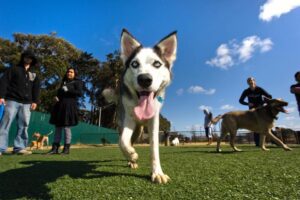
Introduction:
The world of dogs is filled with boundless fascination and unparalleled companionship. They’re an integral part of human history, revered for their loyalty, intelligence, and diverse roles in society. While we commonly refer to them simply as “dogs,” there exists a deeper, more scientific nomenclature for our beloved furry friends: Canis lupus familiaris.
Unveiling the Scientific Name:
Canis lupus familiaris might seem like a mouthful at first glance, but its breakdown unveils the genetic and historical connections that dogs share with their wild ancestors. The term “Canis” refers to the genus encompassing the family of canids, which includes wolves, coyotes, and other wild dog species. “Lupus” directly translates to “wolf” in Latin, while “familiaris” signifies domestication or familiarity. Hence, the scientific name for dog, Canis lupus familiaris, translates to the domesticated subspecies of the gray wolf.
Evolutionary Journey of Canis lupus familiaris:
The journey of Canis lupus familiaris dates back thousands of years. Scientific research and archaeological findings indicate that dogs were the first animals to be domesticated by humans, forming a unique bond that has persisted through the ages. This domestication process led to the divergence of dogs from their wild ancestors, resulting in the wide array of breeds we cherish today.
Genetic studies have revealed fascinating insights into the intricate relationship between modern dogs and ancient wolves. Despite their domestication, dogs still share a significant percentage of their DNA with wolves. This genetic connection not only highlights their shared ancestry but also sheds light on the remarkable adaptability and diversity within the Canis species.
Role of Canis lupus familiaris in Human Society:
From working alongside humans as herders, hunters, and guardians to providing invaluable emotional support as therapy and service animals, dogs play multifaceted roles in our lives. Their exceptional abilities have made them indispensable in various fields, including search and rescue, law enforcement, and aiding individuals with disabilities.
Moreover, the bond between humans and dogs goes beyond mere companionship. Studies have shown that owning a dog can have numerous health benefits, such as reducing stress, alleviating feelings of loneliness, and promoting physical activity through regular walks and playtime.
Diversity in Canine Breeds:
The vast diversity of dog breeds is a testament to the ingenuity of selective breeding over centuries. From the towering Great Dane to the pint-sized Chihuahua, each breed exhibits unique physical traits, temperaments, and specialized skills honed through generations of selective breeding.
Interestingly, the classification of breeds is not solely based on appearance. Different breeds have been selectively bred for specific purposes, resulting in variations in behavior, intelligence, and adaptability. For instance, working breeds like Border Collies excel in herding, while breeds like Golden Retrievers are renowned for their friendly disposition and suitability as family pets.
Ethical Considerations in Dog Breeding:
While selective breeding has led to the creation of diverse dog breeds, it has also raised ethical concerns. In pursuit of specific physical traits or skills, some breeding practices have resulted in health issues and genetic predispositions to certain diseases among certain breeds.
Ethical breeding practices emphasize the well-being of the dogs, prioritizing health, temperament, and overall quality of life over aesthetic attributes. Responsible breeders focus on preserving breed standards while mitigating genetic health concerns through careful selection and health screening.
Conclusion:
Canis lupus familiaris, the scientific name for dog, encapsulates the rich history, genetic connections, and profound impact that dogs have on human society. From their ancestral ties with wolves to their diverse roles and breeds, dogs continue to enrich our lives in countless ways.
As we delve deeper into understanding the scientific complexities behind the name, it becomes evident that the love and companionship we share with these four-legged companions transcend mere words or classifications. Canis lupus familiaris remains a testament to the enduring bond between humans and their oldest, most loyal companions dogs.



